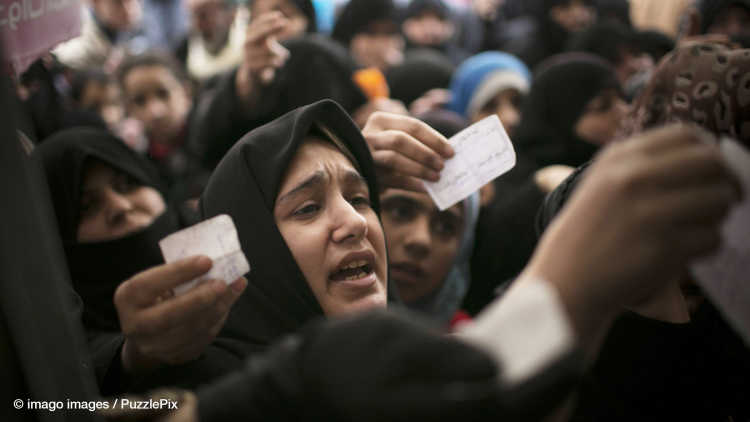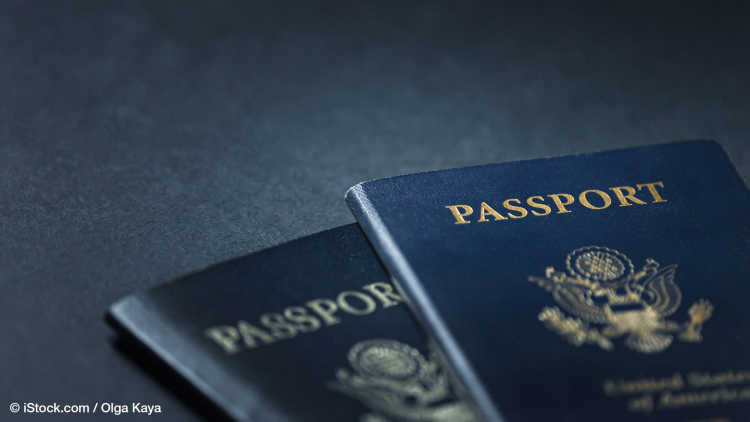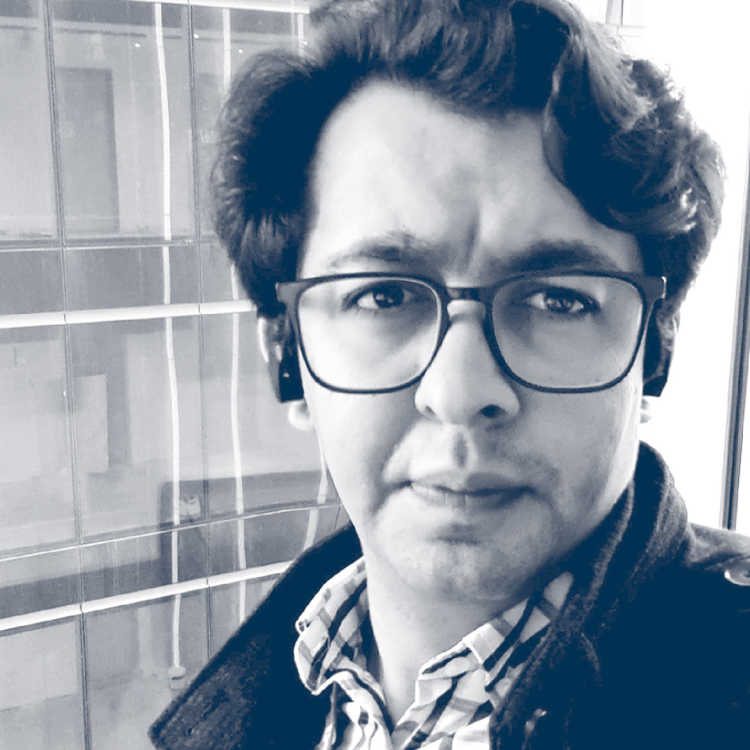- Startseite
- Publikationen
- GIGA Focus
- “The Right to Have Rights”: Legal Identity Documentation in the Syrian Civil War
GIGA Focus Nahost
„Das Recht, Rechte zu haben“: Die Dokumentation von Identität im syrischen Bürgerkrieg
Nummer 4 | 2021 | ISSN: 1862-3611

Während des syrischen Bürgerkriegs werden Lücken, die der Staat bei der Bereitstellung legaler Identitätsdokumente hinterlässt, von anderen Akteuren gefüllt. Dies zwingt Syrerinnen und Syrer dazu, sich durch ein Wirrwarr ineinandergreifender Identitätsdokumente zu manövrieren, um kleine Vorteile zu erlangen und große Risiken zu bewältigen. Diese Situation betrifft insbesondere syrische Frauen, weil es Einfluss auf ihre Eltern-, Erbschafts- und Eigentumsrechte hat.
Während des Bürgerkriegs haben neben dem syrischen Staat auch der Islamische Staat, die syrische Übergangsregierung/Syrische Nationalkoalition, die Heilsregierung von Hay'at Tahrir al-Sham, die kurdische Autonomieverwaltung sowie die Türkei im nördlichen Syrien zu verschiedenen Zeiten Identitätsdokumente ausgestellt.
Syrerinnen und Syrer sind auf eine Dokumentation ihrer Lebensläufe angewiesen, um sicherzustellen, dass sie und ihre Kinder nicht staatenlos werden. Zudem werden Identitätsdokumente benötigt, um Zugang zu humanitärer Hilfe, zu lokaler Rechtsprechung, zur Gesundheitsversorgung und zum Bildungssystem zu gewährleisten, aber auch um Bewegungsfreiheit durch militärische Kontrollpunkte zu ermöglichen und um Handels- oder Immobilientransaktionen durchzuführen.
Aus der Not geboren versuchen viele Syrerinnen und Syrer über kostspielige und oft unzuverlässige Vermittler (samasira) an offizielle, gefälschte oder falsche Dokumente zu gelangen.
Fehlende Dokumente können dazu führen, dass syrische Frauen, deren Ehemänner getötet wurden, verschwunden sind, vertrieben oder zum Militär eingezogen wurden, besonders gefährdet sind, Eigentumsrechte, auf die sie Anspruch haben, zu verlieren oder nicht wahrnehmen zu können.
Das Problem des Zugangs zu bzw. des Fehlens von offiziellen Identitätsdokumenten ist eine tickende Zeitbombe, die dazu führen könnte, dass eine ganze Generation von Syrerinnen und Syrern zukünftig ohne legale Dokumentation dasteht.
Fazit
Externe Staaten sollten sich dafür einsetzen, dass das syrische Regime die von nichtstaatlichen Akteuren ausgestellten Dokumente, die Ereignisse im Lebenslauf sowie Eigentumstransaktionen nachweisen, (prima facie) anerkennt. Dies würde sicherstellen, dass künftige Generationen von Syrerinnen und Syrern Nachweise über diese Ereignisse besitzen, was dabei helfen könnte, langfristig eine Lawine an Problemen zu vermeiden.
A Person before the Law
In 1951, Hannah Arendt, a stateless, Jewish refugee newly arrived in the United States, wrote that being human does not immediately confer the “right to have rights.” Instead, it is being recognised as a member of a functioning political community that enables an individual to access rights from which they derive certain benefits and duties. In 1948, Article 6 of the Universal Declaration of Human Rights and, some years later, in 1976, Article 16 of the International Covenant on Civil and Political Rights affirmed, “Everyone has the right to recognition everywhere as a person before the law.” This position has only increased in urgency as a result of Sustainable Development Goal 16.9, which makes “legal identity for all” an explicit target by 2030.
The particular phrasing “as a person before the law” works to confirm Arendt’s original hypothesis. Without a functioning political community – most commonly the state (or the community of states in the case of international law) – there is no law to speak of. States bring the law into being, and consequently humans derive their rights by virtue of their relationship to the state.
However, during the Syrian civil war, the task of registering and documenting life-cycle events in Syria has not been fulfilled exclusively by the Syrian state but also by a variety of other actors. These include the Islamic State, the Syrian Interim Government/Syrian National Coalition, Hay’at Tahrir al-Sham’s Salvation Government, the Kurdish Autonomous Administration, and even Turkey in the northern Euphrates Shield zone. A 2019 report by the Norwegian Refugee Council (2019: 2) noted that only 29 per cent of the displaced Syrians surveyed said that it was possible to obtain Syrian state-issued documents in their present location. Meanwhile, 72 per cent reported being able to obtain documents issued by non-state entities.
One major consequence of these bureaucratic practices is that Syrian citizens find themselves caught up in political competitions between the Syrian state and other would-be states, which complicates their “right to have rights.” People need life-cycle events documented for a variety of reasons – not least to ensure they and their children do not become stateless, but also to access humanitarian aid (which often cannot occur without documents attesting to a person’s residence or number of family members), local justice mechanisms, healthcare, and education; to ensure freedom of movement through internal checkpoints; and to conduct trade or real estate transactions (Hampton 2019: 508). While it can enable access to basic rights, possession of non–state-issued documentation also comes with substantial risks. In Syria, non–state-issued documents have frequently been taken by the Syrian state as evidence that people are traitors and/or supporters of the opposition. As a humanitarian working in Syria suggested, “We have not found any other conflict where the risk of retribution linked to an identity document is so pervasive” (Lund 2020).
These machinations – over the production of documents by the state and entities vying to become states – has disproportionately affected Syrian women, particularly around access to parental, inheritance, and property rights. The situation has also given rise to a thriving underworld industry of brokers (Arabic: samasira) that have emerged in response to demand for fraudulent documents as well as official state documents to be issued in absentia. To avoid a generation of undocumented individuals and alleviate an inequitable burden being placed on Syrian women, external states should pressure the Syrian regime to uncouple the details contained in documents issued by non-state actors from their political meaning. This would enable the specific details of life-cycle events that occurred during the war in non–state-controlled areas of Syria to be incorporated into one official Syrian civil registry system. It would also enable external states to recognise such details for the purposes of resettlement.
The Samasira Underworld
Non-state actors in Syria issue legal identity documents to people living within the areas they control as a strategy to usurp and undermine the political power of the Syrian state. However, throughout the war, life-cycle documents issued by the state have remained the documents of choice for most Syrians. As a bureaucrat from Daraʿa said while the area was under the control of the Syrian Interim Government, “People don’t care much about documents issued here, because they aren’t recognised internationally. Any document without international credibility isn’t important” (Synaps 2018: 2). However, for many Syrians who are not living in government-controlled areas or cannot cross front lines because of security concerns it is impossible to register life-cycle events with the Syrian state. This has given rise to a thriving underworld industry of samasira and fraudulent documents. A Syrian university student said that after the regime retook control of southern Syria in mid-2018, “There are many people in the town of Tasil who cannot register their social status due to their fear of leaving the town and moving around. Sometimes people assign someone else to register, such as appointing a lawyer or broker, and they are registering on behalf of the person concerned” (Interview with Syrian university student, March 2021).
Samasira are an emerging type of war profiteer, accruing substantial wealth and social influence as a result of their ability to provide vital life-cycle documents to Syrians in need. A Syrian media activist said that these brokers “are people affiliated with the regime who provide all registration services for a high fee, especially for wanted persons” (Interview with Syrian media activist, January 2021). Samasira are generally men who by virtue of their family or employment situation have connections at Syrian state-run civil registry offices. Importantly, these individuals also have the ability to travel through checkpoints between state and opposition-held territory in order to access and deliver the documents they sell and profit from.
The type of documents samasira supply runs the gamut from completely counterfeit all the way through to official state-issued documents. For example, utilising a broker to have a birth or death registered with the state can cost upwards of USD 500. Connections (wasta) with officials or security services can minimise some of these costs, but the reality is that for most Syrians, they remain prohibitively expensive. As an alternative, many Syrians opt for a less pricey item on a broker’s menu. This could include having a document with a completely false identity or even requisitioning someone else’s identity. Additionally, even if an official state-issued document is provided by a broker, there are no guarantees for the purchaser that the documents themselves are not forged. This puts Syrians at risk of arrest for possessing fake documents.
The Female Household
As a result of the civil war, a CARE report (2021: 2) estimates that 22 per cent of Syrian households are now headed by women (up from only 4 per cent before the war). Even before the war, a woman’s registered legal identity in Syria was linked to that of her husband or father. As a result, the gendered impact around access to and/or loss of legal identity documentation is difficult to overstate. The absence of an official marriage registration or a death certificate for her husband disproportionately affects a woman’s ability to exercise various other cascading rights, particularly in relation to her parental, inheritance, and property rights.
For example, since the onset of the civil war there has been a substantial rise in the number of urfi (customary) marriages. If a marriage is not officially registered it can be difficult for widows, divorcees, and women whose husbands are missing or deceased to register the birth of a child because greater legal burdens are placed on mothers to establish paternity of their children. Lack of official marriage registration and/or the absence of husbands/fathers places an entire generation of children at risk of not being recognised as Syrian nationals and, therefore, of statelessness. As a result, the same women and children become vulnerable to trafficking, child labour, child marriage, and illegal adoption.
Another consequence of unregistered urfi marriages is that because these marriages are not legally recognised by the Syrian state, husbands face no restrictions or prohibitions on divorcing or abandoning their wives. Likewise, without official documentation of their marriage, women run the risk of being unable to claim other rights such as dower, maintenance, or inheritance (Srouji 2015). A former Syrian mayor said, “There are many problems facing the children of the martyrs’ wives who got married during the revolution period and their marriage was not confirmed in government offices with the regime. For example, there are people who were 14 or 15 years of age during the time of opposition control, and during this time no personal identification documentation was issued to them in government departments. After six or seven years had passed, men got married and had children but then got martyred in the war. This means the mother of the children cannot register them due to their inability to register the marriage because of the father’s death” (Interview with former Syrian mayor, March 2021). Registration of new births is the first step in establishing an individual’s legal identity. It helps establish paternity and age and is frequently a prerequisite for documenting subsequent life events and accessing a range of other rights as one gets older. In 2019, the Norwegian Refugee Council (2019: 3) documented that 21 per cent of children five years or younger in northwest Syria were neither listed in the family booklet (a primary source of identification throughout most Middle Eastern countries) nor possessed any other form of documentation such as a birth certificate, birth attestation, or birth notification to prove the veracity of the event. Essentially, these children do not exist on paper. If children are not documented, they remain cut off from other rights including access to education; healthcare; a travel document; housing, land, and property; work opportunities; and, potentially, citizenship.
Discrimination and gendered social norms have also meant that Syrian women have had little experience navigating official registration procedures. The lack of female staff in civil registry offices and shariʿa courts further constrains women’s access to civil documentation mechanisms. Overall lower levels of education, literacy, income, and document possession for women exacerbates their inability to exercise and enjoy their rights to civil documentation. This is compounded by Syrian laws that fine individuals anywhere between SYP 3,000 and 15,000 (USD 2.50 – USD 120) for not registering a newborn within one month (Syrian Arab Republic Ministry of Interior, Civil Affairs Directorate and UNHCR, 2018). While the bottom end of this spectrum may appear minimal, in addition to the above legal barriers and the fact that many female-led households in Syria now exist on USD 20 per month, these are prices few, vulnerable Syrian women can afford, making them less inclined to try to register the birth of a child (Tsurkov 2020: 6).
Accessing and Losing Property Rights
Legal identity documents also play a significant role in Syrians’ ability to access their properties, particularly for those who have property in both government-held and non–government-held areas. For example, Syrians have reported being turned away at checkpoints for not having the correct identity documents. There have also been reports of property ownership and identity documents, including marriage certificates, being confiscated or destroyed at checkpoints. Women and children are especially at risk in such circumstances. In many Syrian families, men are the registered owners of property. For Syrian women whose husbands have been killed, disappeared, displaced, or conscripted into the military, lack of identity documentation or marriage certificates can mean women are at risk of losing or being unable to inherit their properties. Similarly, children whose birth has not been properly registered, or whose parents’ marriage is not registered, may not be eligible to inherit property they are entitled to (Stubblefield and Joireman 2019: 8).
Additionally, issues relating to legal identity documentation may impact Syrians’ ability to transfer property. The Syrian government requires security clearances for many property sales, and because many people do not have legal identity documents, or instead possess identity documentation that is not recognised by the Syrian government, their ability to sell property is impeded. Moreover, security clearances are withheld from those living outside government-held areas as a method of punishment for those perceived to be supporters of the opposition (Interview with Syrian regime defector, December 2020). As a result, many property sales are conducted informally. However, lack of official registration with the state’s land registry puts property owners at risk of being unable to defend or protect their properties against confiscation or theft. Additionally, while unregistered or informal property records might be able to circumvent the requirement to have a security clearance as well as other legal requirements relating to the sale of property, such properties have limited protections under state law and owners are vulnerable to interference with their property rights (al-Zien 2019: 2). For example, the Syrian government uses the Anti-Terrorism Law to target or arbitrarily detain those it perceives as opposed to it, including political activists and those who have fled to Lebanon and Turkey. Those brought before the Terrorism Court are subjected to confiscations of their own or even their family members’ property. Those who have bought property informally might be vulnerable to it being confiscated if the Terrorism Court identifies the property as being owned by another person presented to the court (Human Rights Watch 2019). There have been reports of people purchasing properties only to later find out that the Terrorism Court had already made a decision to seize the property (Interview with former Syrian mayor, March 2021).
There have also been concerns relating to registration of property transactions in regions outside of government-held areas. Decree 11 of 2016 states that any property transactions registered by authorities aside from the Syrian government are legally invalid. Therefore, properties and property transactions registered by the Salvation Government in Idlib, for example, would be considered invalid if issues relating to these properties were brought before the Syrian government. Other non-state actors in areas outside of Syrian government control have also developed their own registries to document property transactions. While some were more effective than others, all regions that were retaken by the Syrian government have had their non–government-controlled civil registries invalidated by the Syrian state. For example, even though the civil registry in Douma had successfully digitised over 12,000 records, the Syrian government reverted to the original physical records that existed before the opposition took control of Douma (The Day After 2020: 33).
Displacement has also posed a significant challenge to property record registration. In government-held areas, the Syrian government exploits displacement to seize properties owned by displaced persons for its own purposes, and to punish those it perceives as opposed to it (ReliefWeb 2021). In areas outside of government control, large rates of displacement have resulted in absentee property laws, which allow the governing authority to take properties that have been vacant for a certain period of time and give them to others. This practice has reportedly been used by the Salvation Government in Idlib and by the Kurdish Autonomous Administration. This creates additional property-related disputes, as people who have gone, for example, to Turkey for a period of months may return to find that their properties have been taken over by another family (Syria Justice and Accountability Centre 2020; Interview with researcher, August 2021).
A Ticking Time Bomb
To quote one of anthropologist Stephen Lubkemann’s (2008: 249) most well-known statements, “War is not all terror all the time.” This is particularly true in the context of Syria’s 10-year-long civil war, where life has not paused: children continue to be born, people marry, die, seek divorce, and continue to buy and sell property – all of which requires documentation. The inability of individuals to access state-issued legal identity documentation and/or the production and issuance of civil documentation by a range of state and non-state actors inside the territory of Syria is not just a contemporary problem to be solved. As the UN’s Melissa Fleming outlined as early as 2015, the issue of legal identity documentation is a “ticking time bomb” that has the ability to render a generation of Syrians stateless and unable to access even their basic legal “right to have rights.”
Registration and legal recognition of a person through the documentation of life-cycle events and property transactions is normally considered the sole purview of the state. However, the production of legal identity through the issuing of documentation in situations where the sovereignty of the state is contested, such as civil wars, complicates the notion that the state is the sole actor with the ability to confer rights and legal personhood.
Alternate civil registry structures are stand-ins for wider systems of bureaucracy, government, and “the state” in general. During the civil war, actors other than the Syrian state have attempted to confer legal identity upon the citizens living within the area they control for a number of reasons. A primary one is that registering births and deaths, property transactions, and so on, enables actors with ambitions of statehood, such as the Syrian Interim Government and Islamic State, to mimic the trappings of a state by behaving as such. Additionally, running civil registration centres and issuing documents to people is a potent symbol that attempts to shore up one’s own political credentials while simultaneously disputing the political authority of the Syrian state as the only actor legally capable of issuing legal identity documentation.
Syrians have become caught in these networks of competing legal regimes. In most cases, people have little choice other than to navigate these constellations in order to survive, attempting to avoid risks and receive whatever benefits they can. For example, Hay’at Tahrir al-Sham’s Salvation Government, which controls most of Idlib Governorate, is not issuing or updating family booklets unless families relinquish their Syrian government booklet; without a family booklet, it is not possible to access a variety of rights in Idlib, including humanitarian aid.
Administratively, the Syrian regime has, so far, not acknowledged the reality of non–state-issued documentation. This runs the risk of Syrians existing in bureaucratic limbo, leaving newborns undocumented, marriages invalid, and individuals who have lost IDs, passports, birth certificates, or property documentation during the civil war cut off from a range of other rights.
In order to defuse this powder keg, the politics of non–state-issued identity documents should be uncoupled from their practical use. Rather than recognising or legitimating the issuing authority, external states and policy actors should advocate that the Syrian government recognise prima facie the specific event details contained in documents issued by non-state actors. Admittedly, this will be challenging, given that the Syrian regime has shown itself to be particularly immune to external pressure. However, an incentive of self-interest could be leveraged in that it would be detrimental for the Syrian state to leave many thousands (if not millions) of its inhabitants undocumented. Recognising the details contained in non–state-issued documentation would ensure that generations of Syrians have access to documentary evidence of life-cycle events and minimise the cascading effects caused by lack of documentation. In turn, this would reduce the burden placed on the Syrian state’s resources. A first step to doing this would be for external states and the Syrian government to facilitate the recognition of unofficial urfi documents issued by customary or religious leaders and documents issued by medical personnel, rather than those issued by political or military wings of non-state actors. These types of documents could serve, at a minimum, as evidence of key facts, such as identity, biodata, vital events, and family composition, and could facilitate the incorporation of these events into the state-run civil registry system or assist with resettlement claims.
Fußnoten
Literatur
al-Zien, A. (2019), Legal Obstacles to Housing, Land and Property Rights in Syria, Pax for Peace, 6 March, https://paxforpeace.nl/media/download/legal-obstacles-policy-brief-pax.pdf (17 September 2021).
CARE (2021), “If We Don’t Work, We Don’t Eat”: Syrian Women Face Mounting Food Insecurity a Decade into the Conflict, 15 March, www.careevaluations.org/evaluation/if-we-don-t-work-we-don-t-eat-syrian-women-face-mounting-food-insecurity-a-decade-into-the-conflict/ (17 September 2021).
Fleming, Melissa (2015), The Situation in Syria is Only Going to Get Worse…and here’s Why, in: The Guardian, 16 February, www.theguardian.com/global-development-professionals-network/2015/feb/16/situation-syria-is-going-to-get-worse-melissa-fleming-united-nations (17 September 2021).
Hampton, Kathryn (2019), Born in the Twilight Zone: Birth Registration in Insurgent Areas, in: International Review of the Red Cross, 101, 911, 507–536.
Human Rights Watch (2019), Syria: Suspects’ Families Assets Seized, 16 July, https://www.hrw.org/news/2019/07/16/syria-suspects-families-assets-seized (17 September 2021).
Lubkemann, Stephen C. (2008), Culture in Chaos: An Anthropology of the Social Condition in War, Chicago: Chicago University Press.
Lund, Aron (2020), Stop Gap Solutions for Syrians Without Papers, in: The New Humanitarian, 4 August, www.thenewhumanitarian.org/analysis/2020/08/04/syria-documentation-solutions (17 September 2021).
Norwegian Refugee Council (2019), Lost Identity: Challenges Relating to Legal Identification and Civil Documentation in the North-West of the Syrian Arab Republic, December.
ReliefWeb (2021), Syria: Government Stealing Opponents’ Land, 8 April.
Srouji, Kamal (2015), Marriage in Syria: Difficulties, Bribes, and Lack of Recognition, in: The New Humanitarian, 4 August, https://deeply.thenewhumanitarian.org/syria/articles/2015/08/04/marriage-in-syria-difficulties-bribes-and-lack-of-recognition (17 September 2021).
Stubblefield, Emily, and Sandra Joireman (2019), Law, Violence, and Property Expropriation in Syria: Impediments to Restitution and Return, in: Land, 8, 11, 173, https://doi.org/10.3390/land8110173.
Synaps (2018), Before the Ink Dries: Alternative Civil Documents in Syria, April.
Syria Justice and Accountability Centre (2020), Law No.7 in NE Syria: Protection of Property Rights or a Tool for Appropriation, 3 September.
Syrian Arab Republic Ministry of Interior (2018), Civil Affairs Directorate and UNHCR, Civil Documentation and Registration in the Syrian Arab Republic, July, https://data2.unhcr.org/en/documents/download/69169 (17 September 2021).
The Day After (2020), Reality of Housing, Land, And Property Rights in Syria.
Tsurkov, Elizabeth (2020), Syria’s Economic Meltdown, Center for Global Policy, June, https://newlinesinstitute.org/wp-content/uploads/CGP-Syrian-Economic-Meltdown-June2020-1.pdf (17 September 2021).
Gesamtredaktion GIGA Focus
Redaktion GIGA Focus Nahost
Lektorat GIGA Focus Nahost
Forschungsprojekt
Regionalinstitute
Forschungsschwerpunkte
Wie man diesen Artikel zitiert
Sosnowski, Marika, und Noor Hamadeh (2021), „Das Recht, Rechte zu haben“: Die Dokumentation von Identität im syrischen Bürgerkrieg , GIGA Focus Nahost, 4, Hamburg: German Institute for Global and Area Studies (GIGA), https://nbn-resolving.org/urn:nbn:de:0168-ssoar-75531-7
Impressum
Der GIGA Focus ist eine Open-Access-Publikation. Sie kann kostenfrei im Internet gelesen und heruntergeladen werden unter www.giga-hamburg.de/de/publikationen/giga-focus und darf gemäß den Bedingungen der Creative-Commons-Lizenz Attribution-No Derivative Works 3.0 frei vervielfältigt, verbreitet und öffentlich zugänglich gemacht werden. Dies umfasst insbesondere: korrekte Angabe der Erstveröffentlichung als GIGA Focus, keine Bearbeitung oder Kürzung.
Das German Institute for Global and Area Studies (GIGA) – Leibniz-Institut für Globale und Regionale Studien in Hamburg gibt Focus-Reihen zu Afrika, Asien, Lateinamerika, Nahost und zu globalen Fragen heraus. Der GIGA Focus wird vom GIGA redaktionell gestaltet. Die vertretenen Auffassungen stellen die der Autorinnen und Autoren und nicht unbedingt die des Instituts dar. Die Verfassenden sind für den Inhalt ihrer Beiträge verantwortlich. Irrtümer und Auslassungen bleiben vorbehalten. Das GIGA und die Autorinnen und Autoren haften nicht für Richtigkeit und Vollständigkeit oder für Konsequenzen, die sich aus der Nutzung der bereitgestellten Informationen ergeben.














